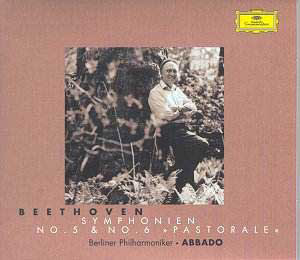This coupling of two very different symphonies represents
part of Claudio Abbado's recent Berlin Philharmonic Beethoven cycle.
Much has already been said and written on the cycle, inevitably making
comparisons with Abbado's Beethoven round with the Vienna Philharmonic
over fifteen years ago. Broadly speaking, Abbado's Beethoven interpretations
have moved from an expansive Furtwängleresque approach as a young
man to those where his own personality is allowed to breathe life into
the music. The consensus is that this has been a good thing and it is
the Sixth Symphony on this recording that gains most.
Abbado is clearly more at home in the Pastoral
than in the Fifth - as you might expect from a great conductor
of Rossini and Verdi. The music trips along, the playing immaculately
conveying the joy and relative relaxation that characterises the work,
yet the storm is sufficiently frightening to make you dive for cover.
There is a crispness and edge here which many may find preferable to
the more beautiful blended sound of Abbado's predecessor: Karajan with
the same orchestra
The Fifth Symphony is another matter. Not only
is Abbado less at home with this rugged, obsessively driven masterpiece,
but he is up against formidable opposition. Carlos Kleiber's ecstatically
received recording with the same orchestra may be over twenty five years
old now but for many it will still be first choice. What Kleiber achieves
is irresistible excitement while maintaining structural integrity. Some
conductors who go hard for excitement do structural damage while those
who go for the solid structural approach can lose out on the excitement.
In spite of some superb playing, Abbado's performance doesn't quite
hit it off on either the excitement or the structural fronts. In a recording
of just a few years ago with the Orchestre Revolutionnaire et Romantique,
John Eliot Gardiner takes risks with some frighteningly speedy tempi
but produces, I think, a great performance. The recordings of the Fifth
that I have most recently listened to are those of Furtwängler
and Toscanini which I did in reviewing a Naxos Toscanini reissue of
the Fifth and Seventh from 1930s performances (http://www.musicweb-international.com
/classrev/2001/Nov01/Beethoven5-7_Toscanini.htm). Toscanini's Fifth
with the Philharmonic-Symphony Orchestra of New York, recorded in 1933,
and Furtwänglerís with the Berlin Philharmonic in 1937, are both
all-time great performances.
If I were trapped on a desert island with some splendid
Hi-Fi and only Beethoven's Fifth to listen to, then I'd still
choose that recording of Furtwängler's, a performance that shines
through the limitations of the pre-war sound. Sixty-five years on, with
the same orchestra, Abbado cannot match his conductor hero.
However, if I were only allowed the Sixth I
might well choose Abbado whose recording combines a fine performance
with great sound.
John Leeman


